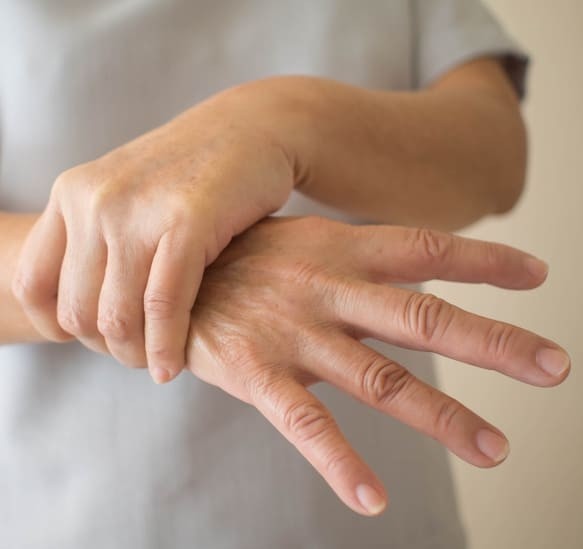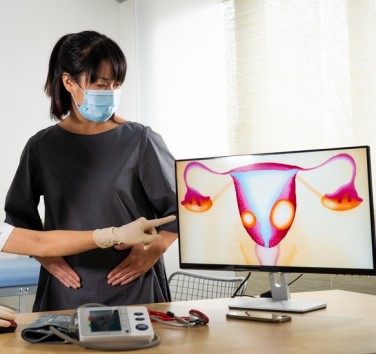In recent years, scientific studies on the subject have suggested that cannabidiol (CBD) is effective in Parkinson's disease because it has positive effects on Parkinson's patients, especially with regard to their non-motor symptoms, such as depression, anxiety and sleep disorders.
In this article, we'll take an in-depth look at what Parkinson's disease means to sufferers, the existing treatments for Parkinson's disease, their side effects, and where CBD fits into all of this.
What is Parkinson's disease?
Parkinson's disease is a neurodegenerative disease characterized by the destruction of dopamine-releasing neurons in the human brain. These neurons are involved in controlling the movements we make. Parkinson's disease is therefore best known for the lack of control that patients have over their movements, their gait and the tremors that they may experience.
This means that Parkinson's patients do not have any particular problem with dementia, except when combined with other diseases that destroy neurons involved in the cognitive system (memory, learning etc...).
The three main symptoms of Parkinson's disease are
-
Trembling of the hands, arms, legs or jaw and head
-
Rigidity of the limbs of the body trunk (thorax, abdominal segment and pelvis)
-
Generalized slowness of movement
-
Impaired balance and coordination, sometimes resulting in falls
In addition to these major physical symptoms, the disease, as with many other illnesses, leads to non-negligible psychological disorders that are inseparable from the patients' overall quality of health. These disorders include:
-
Severe anxiety
-
Depression
-
Sleep disorders
-
Loss of motivation and desire (apathy)
These psychological disorders of Parkinson's disease can be accentuated or attenuated by the patient's lifestyle and environment. The more psychologically supported and active the patient is in the community, the more likely he or she will be able to escape the secondary disorders.
Existing treatments for Parkinson's disease
Today, there are very few effective treatments for Parkinson's disease, and they are mainly drug-based.
Indeed, there are drug treatments that serve to fill the lack of dopamine in the body either by producing it, or by inserting it directly into the body, and finally, by inhibiting the breakdown of its natural production.
All of these treatments do not stop the progression of Parkinson's disease, but they do help to improve the quality of life of patients.
Natural methods such as cannabidiol (CBD) are strongly promoted lately to help the condition of Parkinson's patients. Let's take a look at what CBD is and how it works on Parkinson's disease.
.jpeg)
What is cannabidiol (CBD)?
To explain CBD, we need to go back to the basics and address a common misconception about cannabis. Cannabis is a type of plant that has hundreds of different strains (species). In the common mind, cannabis is associated with a plant that produces a psychoactive effect on the human body, like a drug. Except that this association has remained in people's minds without really taking into account all the other strains of cannabis that do not produce drugs
Indeed, what drugs is the active principle THC, but some cannabis plants do not even have any! Indeed, each strain of the cannabis plant has a different degree of THC and CBD. CBD is also an active ingredient in the plant. This one does not produce any psychoactive effect. It relaxes and provides many therapeutic properties that may be beneficial for certain diseases or symptoms
Many diseases currently benefit from these therapeutic advantages, such as fibromyalgia, epilepsy, endometriosis, nausea and even cancer to some degree.
Today, this type of product is called diet cannabis, or light weed. CBD can also be extracted and isolated in products such as CBD isolate
CBD is a legal product in France and sold in CBD e-shops as 321 CBD.
Now that we know what CBD is in detail, let's see how it works on Parkinson's patients.
The 5 positive effects of CBD on Parkinson's disease
The effect of CBD on anxiety and depression, regardless of the pathology of the patient, is no longer to be proven. CBD acts on the endocannabinoid system of the human body by providing cannabinoid receptors and offering therapeutic inhibitory and relaxing benefits.
In the context of Parkinson's disease, there is a non-exhaustive list of 5 effects to discover below, which improve the quality of life of Parkinson's patients.
Anti-inflammatory and pain relieving effects
CBD is a powerful anti-inflammatory and painkiller whose effects have already been noted on inflammatory diseases such as fibromyalgia or multiple sclerosis and on painful diseases such as migraine through numerous studies A small-scale study on Parkinson's patients has also been conducted and found positive effects of CBD and THC on Parkinson's patients.
Reduction of tremors
Some of the most common symptoms of Parkinson's disease are tremors or uncontrolled muscle movements. Drug treatments do not improve or even worsen this symptom.
A scientific study conducted in 1986 suggests that CBD could help relieve these muscle movements. More recent studies must be conducted to confirm this significant benefit that drastically improves the quality of life of patients.
Reducing depression and psychotic disorders
People with Parkinson's disease are prone to anxiety disorders that can lead to depression and even episodes of psychosis, especially if patients are not well supported and isolated from social events. Indeed, it is estimated that 50% of patients suffer from this. CBD can reduce these disorders thanks to its anti-inflammatory, pain-relieving and soothing effects.
Improves sleep quality
One of the most well-known natural benefits appreciated by CBD users is improved sleep. The scientific studies are formal on this subject, Parkinson's patients can benefit from CBD to sleep better, without side effects.
Support a better quality of life
Finally, a study of 2014 (https://journals.sagepub.com/doi/abs/10.1177/0269881114550355) confirms that the controlled consumption of CBD by Parkinson's patients supports the improvement of their quality of life. More research on this topic needs to be done, however, to confirm the precise effects on different aspects of patients' lives.
.jpeg)
Verdict: Is CBD effective on Parkinson's disease?
Parkinson's disease has no cure today to stop the progression of the disease. However, research to alleviate the symptoms continues to propose various treatments so that patients live better on a daily basis.
CBD is a product that supports this quest by bringing therapeutic properties that can reduce the side effects of existing treatments and soothe or even fight against very restrictive psychological disorders.
However, Parkinson's patients should not self-administer CBD products alongside their medical treatment. It is highly recommended to buy quality products and to consult your doctor beforehand in order to define the dosage.
More information about the products on the e-shop 321 CBD.














